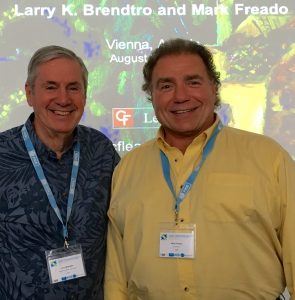by Larry K. Brendtro & Mark Freado
 CF Learning was a partner of the FICE International Conference recently held in Vienna, Austria. The theme “Together Towards a Better World for Children, Adolescents, and Families” brought together 800 professionals and policy leaders from 60 nations. Co-hosting this 33rd FICE World Congress was Child and Youth Care Network (cyc-net.org). Our team presented four sessions introducing CF Learning trainings:
CF Learning was a partner of the FICE International Conference recently held in Vienna, Austria. The theme “Together Towards a Better World for Children, Adolescents, and Families” brought together 800 professionals and policy leaders from 60 nations. Co-hosting this 33rd FICE World Congress was Child and Youth Care Network (cyc-net.org). Our team presented four sessions introducing CF Learning trainings:
• Helping Kids Who Hurt: The Three Pillars of Care
Howard Bath of Allambi Youth Services in Australia highlighted this new adversity and resilience training. While many trauma models are geared for therapists, Three Pillars is designed for those working directly with these youngsters in “the other 23 hours” including child and youth care workers, educators, and parents or foster parents. The latest neuroscience is translated into supportive care-giving strategies.
• Planning Restorative Outcomes: Transforming Assessment
Mark Freado was invited to join an international panel highlighting innovations in serving children and families. He introduced the PRO assessment model which is a strength-based alternative to traditional deficit-based diagnosis. These assessments are being used by schools, courts, and treatment programs to enlist high needs young people as key participants in transforming their lives and futures.
• Respectful Alliance with Youth [RAY] Larry Brendtro and Mark Freado presented this roadmap for building positive youth cultures to counter negative peer influence. RAY taps a half century of research and practice blending two group models: Positive Peer Culture programs in the U.S. and Europe, and Re-ED developed by the American Re-Education Association. Research shows that positive staff cultures are an essential foundation for building positive youth cultures.
• Essentials of Positive Youth Development
Larry Brendtro presented the CF Learning Model of Leadership and Service which highlights six needs that apply both to adults and youth they serve (see Resilience Compass). While terms may vary, decades of research build upon Maslow’s hierarchy of human needs as key to healthy growth—while unmet needs produce most problems. Powerful practical strategies focus on meeting these brain-based drives.

